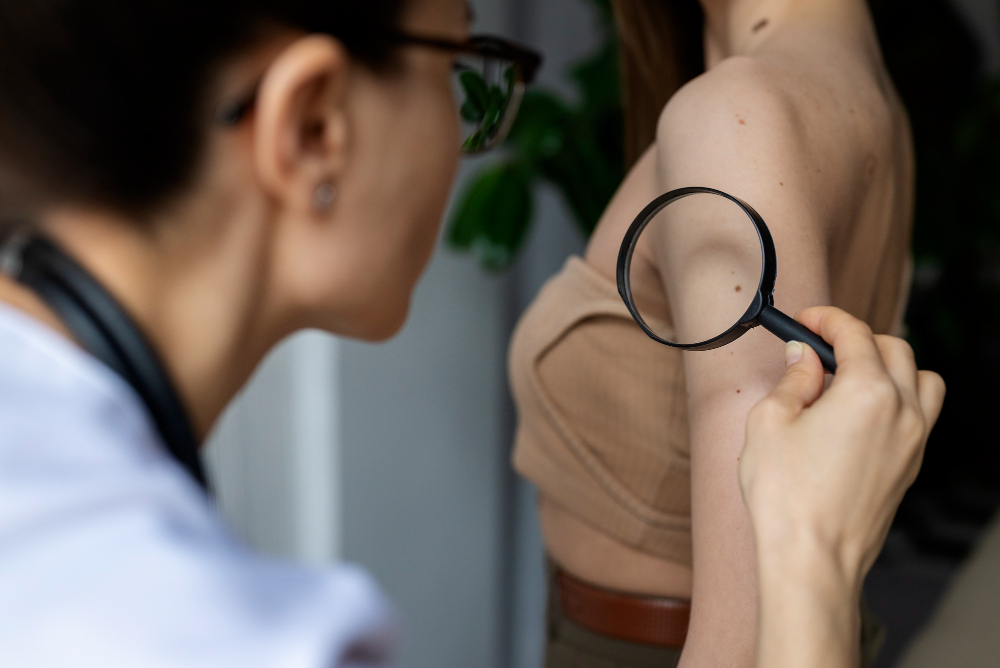
skin cancer
Being diagnosed with skin cancer can feel like a momentous occasion. Basal cell carcinoma, squamous cell carcinoma, melanoma—whatever type of skin cancer someone has, the term “skin cancer” undoubtedly elicits understandable fear and uncertainty. Fortunately, with advancements in early detection and treatment, survival rates for most skin cancers are very high. So the real question that many patients and survivors wonder is: Can I return to having a normal life after skin cancer?
The answer in most cases is that you certainly can. With appropriate treatment, routine follow-ups, and some healthy lifestyle changes, you can go on to have a full, active, and healthy life after being diagnosed with skin cancer. So, this article will look at what life after skin cancer looks like—physically, emotionally, and practically—and how to take steps to safeguard your health and return to a normal life again.
Physical recovery post-treatment
The majority of treatments for skin cancer are outpatient procedures that do not require prolonged hospital stays or extended recovery periods. Common treatment options include:
Surgical removal of cancerous tissue
Mohs surgery (an excisional surgery that is very precise, and is often used for facial skin cancers)
Cryotherapy (freezing)
Topical medications
Radiation therapy or immunotherapy, in the case of advanced skin cancers
Recovery depends on the method of treatment and extent of treatment. Many patients have few, if any, physical side effects. Scarring is also a possibility, especially in visible areas. Over time, however, healing and cosmetic concerns can be addressed.
In general, the physical impact of skin cancer treatment is mild to moderate, allowing most people to return to work, exercise, social activities, and hobbies with little, if any, interruptions.
Follow-Up Care: A New Now
Though you may recover faster physically, the journey goes beyond finishing treatment. Regular follow-up appointments become part of your future. Your dermatologist will most likely recommend the following:
Skin checks every 3-12 months
Self-exams at home watching for moles and spots
Watching for new or returning growths
This forward-thinking approach does not intend to produce anxiety, but rather peace of mind. Many patients in time come to feel comfort in these Touchpoints as they take charge of their health.
Emotional Costs: Healing the Mind, Too
When it comes to the emotional costs of skin cancer, they are often underestimated. Even if the status is good, the term “cancer” can have lasting emotional consequences. It’s normal to experience:
Worry or anxiety about recurrence
Changes in body image, particularly if there are visible scars
Depression or post-cancer stress (which is often not discussed)
Changes in your view of health and lifestyle
Speaking to a counselor, joining a local support group or even participating in a digital community can be really beneficial. Emotional healing and emotional recovery are important, too – and give it time. But many survivors report they emerge from the experience with a new perspective on purpose in life and gratitude for life.
Lifestyle Changes After Skin Cancer for Sustained Health
There are some important changes related to sun exposure that will often need to be implemented after skin cancer, but they are very doable and will eventually become second nature.
- Sun Protection Now Becomes a Daily Habit.
Remember that protecting your skin is essential to reduce the chances of a recurrence or to develop another cancer:
Use broad-spectrum sunscreen with an SPF of at least 30 or greater for daily use.
Apply it every 2 hours when you are outside, or immediately after swimming or sweating.
Wear sun protective clothing which includes wide hats and UV-blocking sunglasses.
Stay in the shade while outside, especially during peak sun hours (10 am − 4 pm).
Do not use tanning beds or sunbathe intentionally.
All of these habits will help to reduce your risk of developing future skin cancers and improve your overall skin health.
- Healthy Lifestyle Choices Enhance Overall Recovery
Beyond sun safety, overall wellness has an effect on your long-term recovery:
- Consume antioxidant rich foods in your everyday diet
- Participate in exercise regularly, both to improve immunity and improve mood
- Do not smoke (or establish your smoking cessation) and minimize alcohol intake
- Manage stress using mindfulness practices or other relaxation techniques
Making these lifestyle modifications will help not only support skin health, but will also help to prevent other chronic conditions.
Relationships, Work and Social Life
The vast majority of people return to their normal daily activities after experiencing skin cancer. They can return to work, travel, exercise, and socialize (keeping in mind that people take different approaches to skin protection when involved in outside activities).
For those whose appearance was affected by treatment, it may take some time to regain confidence. Fortunately, there are many cosmetic dermatology options (laser treatments, scar revision, skin camouflage) that may assist. Having emotional support from family members, friends, or a support group can also be important in the adjustment process.
A New Way of Looking at Life
Arguably, the most transformative result of surviving skin cancer is a change in mindset. For many survivors, the most report:
- Increased appreciation for health and wellness
- Heightened awareness of sun safety
- A wish to enlighten others about prevention
- A drive to pursue healthier lifestyles
In short, instead of thinking of skin cancer as a conclusion to “normal life,” it can act as a pivot point—an opportunity to be more conscious and purposeful in how we live.
Conclusion: Living Fully After Skin Cancer
So, can you live a normal life after skin cancer? Absolutely. For the vast majority of people, treatment is effective, recovery is smooth, and life after cancer continues—often with even more intention and appreciation than before.
With regular check-ups, sun safety, and healthy habits, your risk of recurrence can be significantly reduced. And while some changes may be necessary, they don’t prevent you from enjoying the people, activities, and moments that matter most.
A skin cancer diagnosis is a challenge, but it’s not a life sentence. With the right support and mindset, you can not only survive but truly thrive by opting for a good comprehensive skin check near me.








